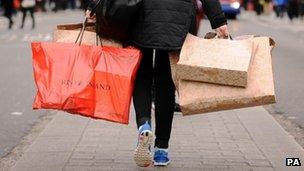More High Street shops shut, says British Retail Consortium
- Published

The Welsh government said it was trying to improve conditions to "allow the private sector to grow"
High Street shop vacancy rates have risen to 17% in Wales while the UK saw a slight reduction.
The figures also show a 10% decline in footfall in Wales in January blamed on the increase in closed stores.
The Welsh Conservatives said the figures showed High Streets in Wales "are faring far worse than those in other parts of the UK".
The Welsh government said it was trying to improve conditions to "allow the private sector to grow".
The Federation of Small Business in Wales (FSB ) called on ministers and local authorities to do more "to bring life back to our town centres".
The research, external published on Monday jointly by the British Retail Consortium (BRC) and research group Springboard shows footfall in January was 4.6% lower than a year ago in the UK.
And the national town centre vacancy rate in the UK was 10.9% in January 2013, down from 11.3% in October 2012.
But Wales saw an increase of 1.9% from 15.1% to 17.0%.
In Mold, Flintshire, there were no empty shops in the run-up to Christmas.
'Ongoing efforts'
However, the latest report to the town council said that four have shut their doors in recent weeks.
Monmouth Conservative AM Nick Ramsay, shadow minister for business, said: "These figures are concerning and confirm the need for a bold and ambitious strategy from the Welsh government to revitalise the Welsh high street to improve the shopping experience.
"Vacant and boarded-up shops can make our High Streets look drab and neglected, so we need to use business rates imaginatively to help bring empty premises back into use."
A Welsh government spokesman said: "We will consider the report's findings as part of our ongoing efforts to improve the conditions necessary to allow the private sector to grow and create jobs."
It has been holding reviews into business rates and the difficulties faced by small businesses in Wales when they try to borrow from banks.
Out-of-town developments
Meanwhile, a Welsh Assembly inquiry was set up to look at ways to regenerate Welsh town centres while local authorities have been trying to take their own action.
Springboard research director Diane Wehrle blamed the increase in vacancy rates in Wales on the recent closure key High Street names like HMV.
"The premise that high vacancy rates tend to perpetuate low footfall appears to hold true with a decline in footfall of -10.1% in Wales alongside an increase in a vacancy rate of 1.9% from October," she said.
A FSB Wales spokesperson said a recent survey of members - aside from economic conditions - showed business rates, out-of-town developments and the cost of car parking were the "biggest challenges facing small businesses on the High Street".
She said: "FSB Wales has already welcomed the extension of the small business rate relief by the Welsh government but believes that allowing local authorities to retain a proportion of the business rates they collect would enable them to boost their local economies."
The Welsh Local Government Association (WLGA), which represents councils, said: "Local government in Wales is working hard to ensure that local high streets and city centres can continue to function with a range of regeneration schemes being put in place to either attract inward investment or devise alternative ways of developing high-street and city centre resilience.
"Increasingly, such activity is focussing on the need to identify alternative uses, and maximise the important contribution that 'other' social and community based activities can make to sustainable high street regeneration."
- Published16 January 2013
- Published15 December 2011
- Published14 November 2012
- Published26 June 2012
- Published7 February 2012